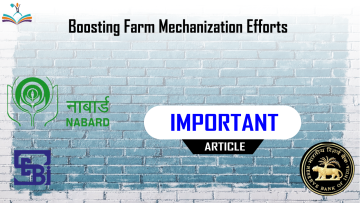
DESCRIPTIVE ENGLISH, ESSAY WRITING, ARTICLE
The content of this editorial, which was published on an unspecified date, is drawn from an article titled “Skills shortage hampering farm mechanisation” that was published in The Hindu newspaper on April 13, 2023. The editorial explores the challenges facing India’s Farm Mechanization Efforts and proposes solutions to address them.
Important article for Essay Writing for SEBI Grade A 2023, NABARD Grade A / B 2023 and RBI Grade B 2023
The National Council of Applied Economic Research (NCAER) has recently released a white paper that highlights significant challenges faced by the farm machinery industry in India in meeting the demands of small and marginal farmers.
The industry faces challenges on both the demand and supply sides. In comparison to other countries, farm mechanisation in India is low at 40-45%, while it is 95% in the US, 75% in Brazil, and 57% in China.
Despite the low level of mechanization in India, the industry faces significant obstacles in terms of skills shortages and a lack of awareness among farmers about technology and machinery management.
What is the Farm Machinery Industry?
- The Farm Machinery Industry is a sector that produces and supplies a variety of machinery, equipment, and tools that are used in agriculture and farming activities, such as ploughing, planting, harvesting, and more.
- These machines are designed to improve productivity and efficiency in farming operations, and the industry caters to both small-scale and large-scale farming equipment.
- Some examples of the products offered by the industry include tractors, combine harvesters, irrigation systems, tillers, and more.
Challenges faced by the Farm Machinery Industry in India
Introduction:
The Farm Machinery Industry plays a crucial role in agriculture and farming activities such as ploughing, planting, harvesting, etc. However, despite its importance, the industry faces significant challenges in meeting the demands of small and marginal farmers in India. This article discusses the challenges faced by the Farm Machinery Industry in India.
Skills Shortage:
The shortage of skills is a pressing issue that creates a low-equilibrium trap for the industry. Village craftsmen represent the largest group, primarily catering to Indian farmers by supplying, repairing, and maintaining farm machinery. However, the shortage of skilled personnel in the Micro, Small, and Medium Enterprises (MSMEs) often leads to poor quality and a lack of access to the latest technology.
Lack of Adequate Information:
There is a lack of adequate information and awareness among farmers about the technology and the management of machinery. Consequently, their selection of machinery is poor, often making it a wasted investment.
High Capital Cost:
Farm machinery is expensive, and farmers may not have the resources to invest in new equipment. This can lead to a lack of access to the latest technology and reduced efficiency in farming operations.
Rapidly Changing Technology:
Farm machinery technology is evolving rapidly, and manufacturers must continually invest in research and development to keep up. This can be challenging for smaller manufacturers who may not have the resources to innovate quickly.
Dependence on Weather Conditions:
Farm machinery is highly dependent on weather conditions and adverse weather can cause delays and disrupt farming operations. This can result in lost productivity and reduced profitability.
Maintenance and Repair:
Farm machinery requires regular maintenance and repairs to keep it running efficiently. This can be costly and time-consuming, especially for smaller farmers who may not have the resources to maintain their equipment properly.
Environmental Concerns:
There is growing concern over the environmental impact of farming, including the use of fossil fuels in farm machinery. Manufacturers are under pressure to develop more sustainable and environmentally friendly equipment.
The Farm Machinery Industry faces a range of challenges in meeting the demands of small and marginal farmers in India. The industry needs to address these challenges to improve productivity, efficiency, and sustainability in farming operations.
Way Forward for Farm Machinery Industry:
Addressing Skills Shortages and Encouraging Adoption
- Addressing challenges faced by the Farm Machinery Industry in India
The article suggests various ways to address the challenges faced by the farm machinery industry, which includes a shortage of skills, lack of information, high capital cost, rapidly changing technology, dependence on weather conditions, maintenance and repair, and environmental concerns.
- The following measures can be taken to move forward:
- Address Skilling Shortages: The Agricultural Skills Council of India should work at the district level to address skills shortages on the demand side. Public-private partnerships with Custom Hiring Centres may be especially useful, and Indian Council of Agricultural Research (ICAR) institutes can offer short courses that address skills shortages on the demand side. Industrial Training Institutes (ITIs) can be leveraged to address the skill gaps in repair and maintenance, and service centres at the regional and State levels may be promoted in the private and industrial sectors.
- Provisioning available Technical Knowledge and Skills: The District Industries Centre should work with local industrial clusters so that ITIs can provide relevant courses with the latest available technical knowledge and skills. Dual vocational skilling programmes will greatly benefit industrial clusters located in tier-II and tier-III cities, and MSMEs should also leverage the Apprentices Policy of the Central Government.


